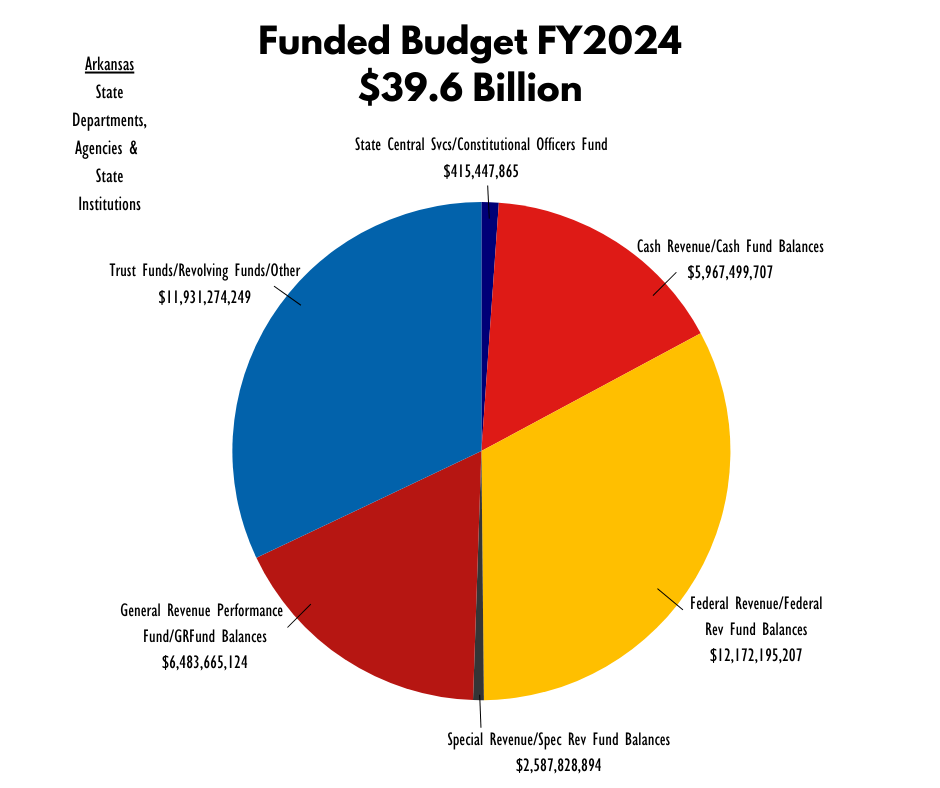
Severe cuts to services, such as Medicaid, threaten the well-being of children and families.
As we are in the midst of the 95th General Assembly’s regular session, there is much talk about the state budget. When legislators and the media refer to the budget, they are usually referencing the general revenue budget, the budget over which the governor and legislature have the most discretion. However, there are other extremely important elements to the total state budget, and none is larger than the U.S. federal contribution.
For the last completed fiscal year, FY 2023-24, the entire Arkansas funded budget was just under $40 billion. Federal revenue made up $12.2 billion of this, or 30.7%. By comparison, general revenue came in at $6.5 billion, or 16.4%.

Source: Bureau of Legislative Research, Financial Data for Arkansas “B-Book”, September 2024.
Federal funding does not just go to the Arkansas state government. Funding is also awarded directly to local governments across the state. According to usafacts.org, in fiscal year 2021 the federal government transferred $11.2 billion to the state and local governments. Across the board, this was 22.7% of all revenue available to governments in Arkansas. This is 3.2% higher than the average across all states in the country, meaning federal funds contribute a larger percentage in Arkansas than in many other states. Finally, 35% of the nonprofit organizations in the state receive federal grants. Again, this is higher than the average across all states, 5% higher.
And how do the state and local governments use this money? In all the ways that improve our lives and the lives of our children. These funds are used for education, health care, and infrastructure. According to usaspending.gov, the top federal agencies transferring money to Arkansas include the Department of Health and Human Services, the Social Security Administration, the Department of Commerce, the Department of Veteran Affairs, and the Department of Agriculture. Among the top receiving agencies are the Arkansas Department of Human Services, the Arkansas Economic Development Commission, and the Arkansas Department of Education. These funds benefit all Arkansans and their families.
One important example is that of Medicaid. Medicaid is health insurance for people we care about, including seniors in nursing homes, pregnant women, low-income children and their parents, and people with disabilities. Generally speaking, Medicaid helps individuals that earn less than $30,000 annually. As mentioned elsewhere, a full-time, minimum wage job provides $23,000 a year, and half a million Arkansans make less than this.
According to the Center for Children and Families, 63% of federal funding sent to the state of Arkansas, or nearly $7 billion, is for Medicaid. This money covers 41% of births, insures 47% of children, and pays for 67% of nursing home residents. You may benefit from Medicaid. But if not, you likely know someone – a family member, friend, or neighbor – who gets their health insurance through Medicaid.
Now members of the U.S. Congress are suggesting cuts of as much as $2.5 trillion to Medicaid, which is approximately one-third of the total federal Medicaid budget. It is impossible to implement cuts of this magnitude without taking health care away from the very people the program is designed to protect. The loss of home and nursing care for seniors will remove critical care and leave families struggling to cover the costs for their parents and grandparents. Young children will lose important services such early screening and detection, making it difficult to manage development delays, behavioral issues, and health challenges like asthma.
Yes, we need to improve health care and make it more affordable. We need to stop greedy corporations from driving up costs to make more profits. But cutting Medicaid is not the solution. These cuts won’t make health care more affordable, but will undermine financial stability, especially for rural hospitals and communities. Federal Medicaid cuts will raise health care costs for all of us. Our state government will struggle to make up the difference. And thanks to income tax cuts over the past decade, the state of Arkansas has no funds to make up for the shortfall.
As we observe the state budget-making process in Little Rock this session, we also need to pay attention to the same in Washington, DC. The federal and state budgets are linked, and both contribute to the development of our state and its people.
